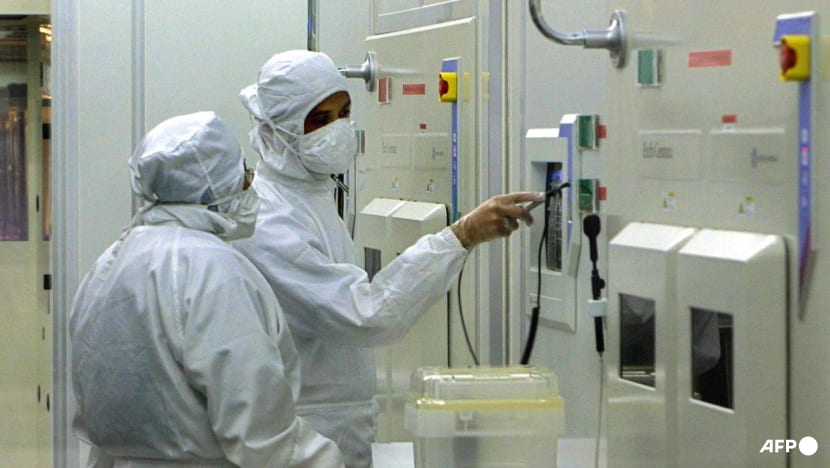KUALA LUMPUR: A tight labour market but with stagnant wages. A lack of skilled talent in critical sectors even though such workers do exist. Only enough jobs for one-sixth of Malaysia’s 300,000 university graduates yearly.
These are Malaysia’s employment “paradoxes”, identified by its Human Resources Minister Steven Sim.
The three paradoxes mean the country needs to utilise its skilled professionals more effectively through better coordination between policymakers, employers and educators, observers told CNA.
The minister shared his views at a lively panel discussion on operationalising Malaysia’s education and training agenda held at Sunway University on Monday (Jan 13).
He noted that the paradoxes centre around how Malaysia shows “positive” statistics in unemployment and the number of graduates produced, but struggles when it comes to wages, underemployment and the availability of high-paying jobs.
To address these paradoxes, Sim stressed the importance of upskilling workers through programmes such as TVET (technical and vocational education and training) courses and government initiatives to boost wages and jobs.
Sim also spoke about plans to make the country’s TVET programme more attractive and accessible, and revealed that he himself had enrolled in a TVET course in corporate leadership.
Sunway University economics professor Yeah Kim Leng told CNA that the three paradoxes are “symptomatic” of how the Malaysian economy is underperforming and registering below its growth potential.
“A more responsive national education policy and labour market policy are needed to coordinate the nation’s human resource planning and development. It is a call to action for policymakers, employers and educators to develop and harness the country’s human capital more effectively,” he said.
“With low unemployment rate and rising investment that will create more employment opportunities, the three paradoxes reflect growth constraints rather than growth traps.”
THREE PARADOXES
According to Sim, the first paradox is a “wage-to-job” paradox, where low unemployment – currently at 3.2 per cent – is not translating to higher wages.
“You imagine that if it is a workers’ market, wages would be improving because of the demand of the workers and low unemployment. But unfortunately, the paradox in this situation is that wages are relatively low. Median monthly salary is about RM2,700 (US$600) plus a month,” he said.
The second is the “skills-to-job” paradox, where employers complain that Malaysia does not have enough skilled talent especially in the STEM (science, technology, engineering and mathematics) sector, Sim said.
The irony here, Sim pointed out, is that Malaysia has a “relatively high” underemployment rate of over 36 per cent due to a mismatch between job needs and academic qualifications, meaning the country actually has STEM talent who are working in underqualified jobs.
The third is what Sim called the “education-to-job” paradox, where he stated that Malaysia produces about 300,000 graduates every year – with one-third of it in STEM fields – but with only 50,000 high-paying, skilled jobs available.
“So you have this current issue that we are facing: There are some positive numbers, but unfortunately, the paradox is that there are also some challenges and issues that we have to face,” Sim said.

Edwin Oh Chun Kit, a researcher at the Institute of Strategic Analysis and Policy Research (INSAP), a Malaysia think tank, warned that these paradoxes, if unaddressed, will increase the risk of further long-term economic stagnation.
“The administration must strive to streamline inter-ministerial coordination and improve oversight for both TVET and higher education to ensure alignment with industry demands,” he told CNA.
Employers should also advise the government and work with educational institutions to “provide real-world insights into evolving workforce needs”, Oh said.
MAKING TVET MORE ATTRACTIVE
TVET aims to produce graduates in fields like manufacturing, construction, healthcare and information technology with skills relevant to industry needs.
TVET courses, which range from levels 1 to 5 with the highest being equivalent to an advanced diploma or associate degree, are offered at public and private universities, polytechnics and community colleges across Malaysia.
“With greater synergy in these efforts, Malaysia can effectively bridge the skills mismatch, improve labour market outcomes, and drive sustainable economic growth,” Oh added.
Malaysia produces about 100,000 TVET graduates each year. The government is targeting 500,000 students to enrol in TVET programmes across all 1,398 TVET institutions nationwide this year, said Deputy Prime Minister Ahmad Zahid Hamidi, who is also National TVET Council chairman.
“The courses provided are tailored to meet employer demands, particularly from industries, and Memorandums of Agreement have been signed between TVET institutions and employers,” he said on Jan 11 as quoted by Bernama.
“This means that upon completing their courses, TVET graduates will immediately be employed by these employers.”
In a bid to make TVET more attractive, Sim said he had proposed to the Cabinet to introduce levels 6, 7 and 8 for the programme, “sort of” equivalent to a bachelor’s degree, master’s degree and a doctorate.
Other plans include making TVET more accessible by introducing a one-stop application portal and a “skill university” without a fixed term schedule and racial quota that allows students from diverse backgrounds to enrol at any time, Sim said.
TVET NOT LIKE UNIVERSITY EDUCATION
However, Sim cautioned that the moves are not meant to make TVET more akin to a university education, noting that the latter is not designed to meet current job demands.
“We have to rethink university. I think, essentially, university is for you to go (for) four years (of) deep thinking. Think about the meaning of life. What is love? What is pain? What is death? Where is God? Who is God?” he said.
“But industry may not necessarily benefit from such a model of training. Which is why the obsession with making TVET to be like university, I think we should change.”
Sim later clarified that a university education was still needed for such philosophical training, but not for current industrial needs.
“What I’m trying to say is this: If you are thinking the current university model will be able to fill your job market demand, then you are delusional. Because universities … (are) not created for the industrialised world,” he added.

Sim then revealed he was also pursuing a level 5 TVET course in corporate leadership, as he invited 100 corporate, community and union leaders to join him in upskilling through TVET as the programme’s “ambassadors”.
Nevertheless, the minister acknowledged it was important to address the concerns of workers who might not have been in school for decades and are worried about upskilling.
“It’s so easy for us to talk about going for reskilling, but do we know the anxiety of workers? … I think we have to address that as well,” he added.
ADDRESSING UNDEREMPLOYMENT
Amirah Wan Usamah, a research associate at the Khazanah Research Institute, said a study conducted by her institute last year on the career progression of Malaysia’s skilled labour found that TVET graduates had a higher employability rate than non-TVET graduates over the past several years.
“Additionally, when we look at degree-level TVET graduates, there is a much higher proportion of them earning above RM5,000 compared to their non-TVET counterparts.
“So, we can see there is quite a high potential coming from TVET graduates, both in their employability and pay.”
According to last year’s TVET Graduate Employability Report, job placement for TVET graduates increased from 87 per cent in 2020 to 94.5 per cent in 2023.
Meanwhile, 3.7 per cent of the 5.92 million graduates in 2022, including degree and diploma holders, were unemployed, according to the Statistics Department.
Amirah said TVET has “strong potential” in addressing the skills-to-job paradox, pointing to an “international shift” from prioritising qualification to technical and soft skills.
“As the labour market and its demands become more dynamic, in part due to technological advancements, there is a perspective shift going from what degree you have, to one that asks, what is it you can do,” she added.
“I think the move forward here, and this is a pattern we are seeing globally, is the movement towards micro-credentials and accredited certifications that happens beyond tertiary education. There is this growing recognition of the importance of lifelong learning and the necessity to adapt to evolving market needs.”
The core issue at the heart of the skills-to-job paradox is not necessarily a lack of qualified graduates, but the misalignment in graduates’ skills and the specific demands of many industries, said INSAP’s Oh.
“This is partly due to a push for university enrolment driven by societal expectations. In many ways, Malaysian society is ingrained to believe a university degree is the only route to career success, which also leads to the perceived lower status of TVET as a viable alternative,” he said.

The skills mismatch is also exacerbated by a lack of language and technical competencies among graduates, Oh said, citing how Malaysia-based employers who do cross-border business prioritise fluency in both English and second languages alongside practical technical skills.
“Moreover, many companies report difficulty finding employees with problem-solving and analytical capabilities, suggesting a gap in how academic programs cultivate critical workplace skills,” he said.
To address this, Oh called on the current administration to consider the establishment of a centralised, multidisciplinary task force comprising representatives from key ministries, industry and academia.
“Such a body can ensure academic curricula and training programs are aligned with dynamic, ever-changing industry needs while fixing the gaps that result from inconsistent inter-ministerial coordination,” he added.
Given the fast-moving nature of industrial needs and the lengthy process of developing new degree programs and producing graduates from them, Amirah admitted that higher education is “always at a bit of a disadvantage”.
Yeah, the economist, suggested a framework for fast-tracking new education and training programmes and curriculum in collaboration with trade and industry associations and leaders to address specific skills shortages.
“The government could also consider providing fiscal incentives to industries facing skills shortages to assist the universities in designing and implementing the required training curriculum,” he said.
RAISING WAGES, CREATING HIGH-PAYING JOBS
Moving on to the lack of high-paying jobs in the education-to-job paradox, Yeah said a “bigger push” in wooing private investment is needed.
Amirah said Malaysia should prioritise promoting and attracting investments that will create high-skilled job opportunities and high wages, and support graduate entrepreneurship – especially among TVET graduates – so they are not seen as job seekers but as potential high-skilled job creators.
“Malaysia’s recent introduction of the progressive wage policy program last year is a step in a positive direction in addressing structural issues surrounding stagnant wage growth, especially among more technical occupations,” she said, referring to the wage-to-job paradox.
“As the program is voluntary, buy-in from the industries is important so that the objectives of promoting wage growth whilst increasing industry productivity is achieved.”
While Sim, the human resources minister, said moves like the progressive and minimum wage are “important” to address these paradoxes, they are “not everything”.
“I personally believe if you want to create higher-paying jobs and improve salaries, we have to move away from the ‘buy cheap, sell cheap’ economic model,” he said.
“(If) you want to buy everything cheap, you want to be subsidised for utilities, you want to buy cheap labour, then you will never be able to improve.”
Sim cited how the government’s Madani Economy Framework aims to boost the economy by “raising the ceiling and raising the floor”.
Raising the ceiling refers to putting in more money to help the economy move up the value chain, with moves like setting aside RM40 billion in this year’s budget to support loan facilities for small- and medium-sized enterprises, and government-linked investment companies aiming for RM25 billion in domestic investments this year, he said.
“But on the other hand, raising the floor means helping our people to upskill, for example, so that they will be able to face the (economy’s) demands,” Sim added.
“It’s not just about individual employers, individual workers being paid or not being paid, but the economy itself is not able to provide (high-paying jobs) at this rate of the last 20 years. So, we have to reconfigure.”
